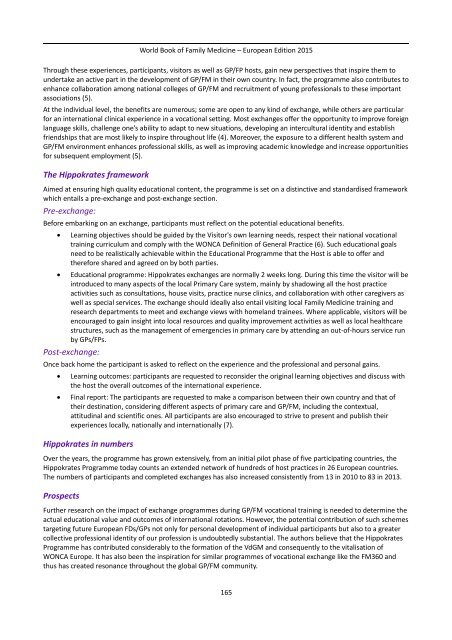Family Medicine
U8UQp
U8UQp
Create successful ePaper yourself
Turn your PDF publications into a flip-book with our unique Google optimized e-Paper software.
World Book of <strong>Family</strong> <strong>Medicine</strong> – European Edition 2015<br />
Through these experiences, participants, visitors as well as GP/FP hosts, gain new perspectives that inspire them to<br />
undertake an active part in the development of GP/FM in their own country. In fact, the programme also contributes to<br />
enhance collaboration among national colleges of GP/FM and recruitment of young professionals to these important<br />
associations (5).<br />
At the individual level, the benefits are numerous; some are open to any kind of exchange, while others are particular<br />
for an international clinical experience in a vocational setting. Most exchanges offer the opportunity to improve foreign<br />
language skills, challenge one’s ability to adapt to new situations, developing an intercultural identity and establish<br />
friendships that are most likely to inspire throughout life (4). Moreover, the exposure to a different health system and<br />
GP/FM environment enhances professional skills, as well as improving academic knowledge and increase opportunities<br />
for subsequent employment (5).<br />
The Hippokrates framework<br />
Aimed at ensuring high quality educational content, the programme is set on a distinctive and standardised framework<br />
which entails a pre-exchange and post-exchange section.<br />
Pre-exchange:<br />
Before embarking on an exchange, participants must reflect on the potential educational benefits.<br />
<br />
<br />
Learning objectives should be guided by the Visitor's own learning needs, respect their national vocational<br />
training curriculum and comply with the WONCA Definition of General Practice (6). Such educational goals<br />
need to be realistically achievable within the Educational Programme that the Host is able to offer and<br />
therefore shared and agreed on by both parties.<br />
Educational programme: Hippokrates exchanges are normally 2 weeks long. During this time the visitor will be<br />
introduced to many aspects of the local Primary Care system, mainly by shadowing all the host practice<br />
activities such as consultations, house visits, practice nurse clinics, and collaboration with other caregivers as<br />
well as special services. The exchange should ideally also entail visiting local <strong>Family</strong> <strong>Medicine</strong> training and<br />
research departments to meet and exchange views with homeland trainees. Where applicable, visitors will be<br />
encouraged to gain insight into local resources and quality improvement activities as well as local healthcare<br />
structures, such as the management of emergencies in primary care by attending an out-of-hours service run<br />
by GPs/FPs.<br />
Post-exchange:<br />
Once back home the participant is asked to reflect on the experience and the professional and personal gains.<br />
<br />
<br />
Learning outcomes: participants are requested to reconsider the original learning objectives and discuss with<br />
the host the overall outcomes of the international experience.<br />
Final report: The participants are requested to make a comparison between their own country and that of<br />
their destination, considering different aspects of primary care and GP/FM, including the contextual,<br />
attitudinal and scientific ones. All participants are also encouraged to strive to present and publish their<br />
experiences locally, nationally and internationally (7).<br />
Hippokrates in numbers<br />
Over the years, the programme has grown extensively, from an initial pilot phase of five participating countries, the<br />
Hippokrates Programme today counts an extended network of hundreds of host practices in 26 European countries.<br />
The numbers of participants and completed exchanges has also increased consistently from 13 in 2010 to 83 in 2013.<br />
Prospects<br />
Further research on the impact of exchange programmes during GP/FM vocational training is needed to determine the<br />
actual educational value and outcomes of international rotations. However, the potential contribution of such schemes<br />
targeting future European FDs/GPs not only for personal development of individual participants but also to a greater<br />
collective professional identity of our profession is undoubtedly substantial. The authors believe that the Hippokrates<br />
Programme has contributed considerably to the formation of the VdGM and consequently to the vitalisation of<br />
WONCA Europe. It has also been the inspiration for similar programmes of vocational exchange like the FM360 and<br />
thus has created resonance throughout the global GP/FM community.<br />
165



